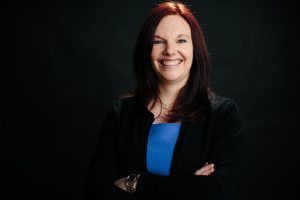
Amy Brown Hughes was hesitant to start on the path of becoming a theologian.
With an age-old narrative that largely excluded women from the field, her classrooms lacked the representation she needed to envision her own success. But, Hughes refused to sit this one out. Instead, she decided to write a new narrative.
At 2 p.m. Friday, June 28 in the Hall of Philosophy, Hughes, assistant professor of theology at Gordon College, will open Chautauqua’s Interfaith Friday Series with “With One Eye Squinted: God, Evil, and Suffering.”
Hughes originally went to school to become an English literature teacher, but said it quickly became clear she needed to pursue what she was really good at: theology. With a lack of female representation in the profession, she said it was initially difficult to justify the switch.
“I did a theology degree without knowing what I was going to do with it,” Hughes said. “I had a lot of encouragement to do missions work, but not so much to be a clergy person, so it didn’t even occur to me that I could be a theologian as a woman. I wasn’t actively told in my degree that was the case, but it was just the narrative. … I had biblical studies professors who were women, but I never had a theologian.”
After graduating from Oral Roberts University in Oklahoma, Hughes went to Texas to work for a missions organization, and shortly after starting, she realized it was not something she wanted to do as a career. Instead, she decided to go to Wheaton College, a Christian liberal arts college in Wheaton, Illinois, to earn her master’s degree so she could teach.
It was at Wheaton that she took her first class with a female professor and gained the inspiration she needed to move forward in her program.
“It was some really awesome mentors there that said, ‘Hey, you should really pursue this, you should write a thesis, you should teach my class, you can do this,’ ” she said. “Having a woman as my professor really helped. I could see myself doing the job.”
One of those mentors encouraged Hughes to stay with Wheaton to earn her doctorate. When she was working on her dissertation, her adviser asked if she knew of any other Evangelical women doing work in theology.
“I sat there and I felt stupid because I couldn’t think of a single one,” she said. “After about 30 seconds, he put me out of my misery and told me there isn’t anyone. I am the first woman to graduate from the Ph.D. program at Wheaton College.”
In 2015, Hughes started teaching at Gordon, a private Christian college in Wenham, Massachusetts. After almost four years, Hughes said the experience has been better than she could have ever imagined.
“I was made to do this,” Hughes said. “I find it to be challenging in really good ways.”
According to Hughes, Gordon stands out due to its ability to make theology accessible to everyone.
“Theology is not just about what you think about things, or having a position on something, or just being able to argue your point,” she said. “I bring to the table a real commitment to an accessible understanding of what theology is. Just watching these students realize that they can participate in the broader, really important conversations is super rewarding for me.”
As a representative from the “broader Evangelical tradition,” Hughes is going to discuss how to think about difficult questions, specifically questions about instances of suffering around the world.
“I am going to talk about how we can discuss what it means to be a person of faith without alienating everyone around us,” she said. “Every major world religion has resources for how we as humans can think about difficult things and how we overlap with other people and other religions. How can we work together so that we can come alongside one another and walk with each other through those difficult times?”
Not only does she want to discuss how to work through the questions, Hughes also wants to use her lecture to help start conversations that will prevent additional conflict.
“You have to think about being with people in those moments of suffering, but also think about how we cannot continue finding ourselves in those situations,” Hughes said. “What are the larger conversations we need to have with one another to mitigate some of these larger issues and restrict those impulses by saying, ‘Hey, this thing that you are bringing into the world is actually causing other people to suffer’? It is so important that we learn to start these conversations so we can really start moving forward.”




